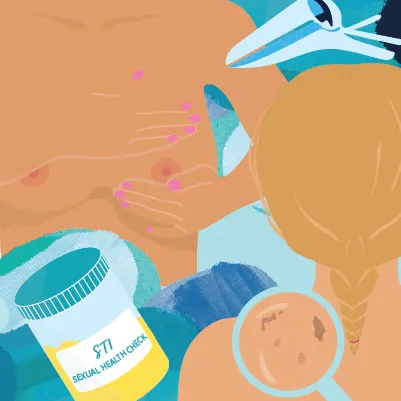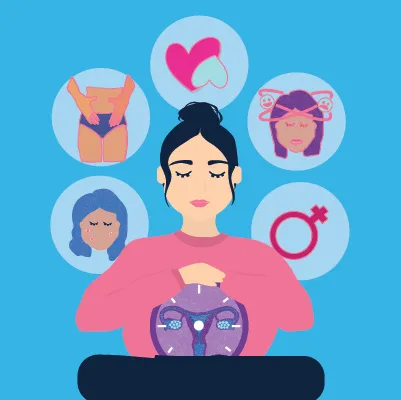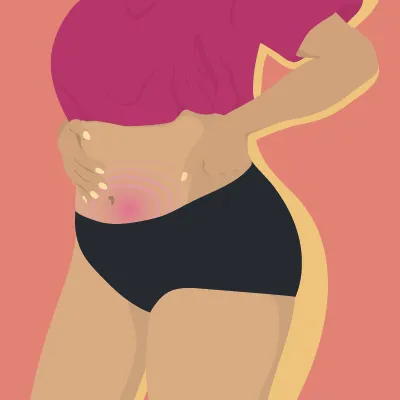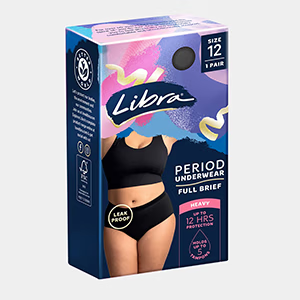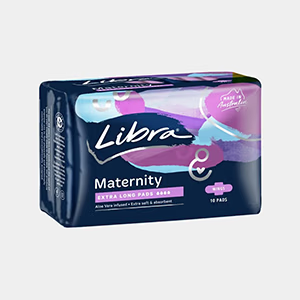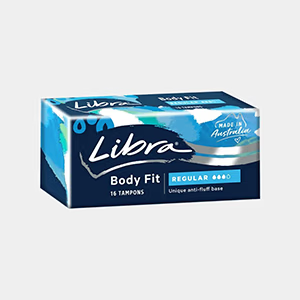Oct 04, 2021
Understanding STIs, Period Sex & Sexual Pleasure with Jonny
STIs, Period Sex, Sexual Pleasure.
If only someone could tell us what it all means!?
Luckily, we’ve partnered with condom connoisseurs, Jonny, to bring our curious community the sex-ed class they never got.
We put out a call on Insta stories for your thoughts on STIs, Period Sex & Sexual Pleasure and your questions in reply. The feedback was super interesting. We mixed it all in our chemistry beaker – and the result? Well, consider your questions – answered.
Sexually Transmitted Infections (STIs)
Three little letters you’d rather not hear.
Sexually transmitted infections come in several forms. They can be bacterial or viral, and transmitted through blood, body fluids or skin-to-skin contact.
Given that 39% of you said you weren’t taught about STIs in school or health class, it’s time to get out your gel pens and start taking notes.
1. Are Sexually Transmitted Infections in your family genes? Like hereditary?
STIs aren’t family heirlooms – they can’t be inherited. However, mothers with STIs can pass on the infection to their baby during pregnancy, delivery, or breastfeeding.
If treatment is sought early enough, the infection can be prevented from passing on. If you’re pregnant and think you might have an infection, have a chat with your doctor.
2. Do STIs stay forever?
Whether STIs stay forever depends on what you’re dealing with. STIs caused by bacteria (such as gonorrhea, syphilis, chlamydia and trichomoniasis) can generally be treated and eradicated by antibiotics.
Viral infections on the other hand (such as HIV or herpes) can be managed, but not completely cured. If you have one of these, you’ll likely be prescribed an antiviral drug that will keep your infection in check, but you might still carry and transmit the virus.
Check in with your doctor early to figure out the best treatment for you.
3. What is the best prevention method for STI? Other than abstinence
Contraception is key to preventing STIs! Whether you’re sexually active or planning to be – safe, consensual sex is the name of every game.
While there’s a whole bunch of contraceptive options out there, contraceptive barriers such as condoms and diaphragms are your best defence against STIs.
Thankfully, Jonny’s eco-conscious condoms are so stylish, you’ll want to show them off like your high school debating trophy or selfie with Harry Styles.
Period Sex
This was an interesting one – 44% of you said you were totally fine with period sex, meaning the majority aren’t keen on getting down and dirty when menstruating.
But before you’ve ruled out almost a quarter of your sex calendar, know that there’s no physical issue with having sex during your period. In fact, there’s a bunch of benefits including:
- It can help to ease menstrual cramps! Orgasms cause the muscles of your uterus to contract. Their release can bring a wave of relief to cramps and a healthy dose of endorphins.
- It may shorten your period! In theory, that same contracting of the uterus can speed up the shedding of your uterine lining.
- It’s a natural lube! No assistance required.
But of course, go with your flow and what you feel comfortable doing.
1. Can you still get pregnant after having period sex?
While the odds are low, getting pregnant after period sex is not impossible.
On days 1-2 of your period, the chances of falling pregnant are nearly zero. But those chances increase each day up to ovulation (when you’re most fertile).
Given that sperm can camp out in your body for up to 5 days, it might still be there when you ovulate if you have sex towards the end of your period.
So, to avoid an unplanned pregnancy, it’s best to play on the safe side and use contraception.
2. Why does period sex feel better than normal sex?
Period sex can feel better because the hormonal fluctuations you experience throughout your cycle cause a change in your libido. This is why many people experience an increase in their sex-drive during their period.
3. How do you stop period sex being so messy?
While we’re all about embracing life’s mess, sometimes, clean sheets are a big vibe.
Sex in the shower is good, clean, fun. The old towel on the bed trick works wonders, too. Or play around with positions that keep off the sheets (like missionary and side-sex).
Sexual Pleasure
It warmed our hearts to hear that 81% of you said you feel empowered when engaging in sex or self-love.
Whether you’re a first-time feeler or long-term fan, here’s the questions about sexual pleasure you wanted answered.
1. What’s the G, A, O & V spot?
G = The G-spot is really more of an area. It’s found at the root of the internal clit and is made up of the vagina, clitoral body, and legs of the clitoris.
A = The A-spot (or ‘anterior fornix’) is found past the G-spot, about 8-10cm inside the vagina between the cervix and bladder.
O = The O-spot (sometimes called the C-spot) is found behind the cervix. The cervix has a bunch of sensitive nerve-endings, so you can bring on a cervical orgasm when you (carefully) apply pressure.
V = The V-spot (or ‘vaginal vestibule’) is the opening of the vagina – just past the inner lips before you enter the canal. It’s got a lot of nerve endings that can feel V good when stimulated.
2. What’s the right age to start self-pleasure?
It’s totally normal and natural to want to explore your body and pleasure yourself. But there’s no rush! It’s up to you and whenever you’re ready to start self-pleasure!
3. Is self-pleasure wrong?
Absolutely not! We don’t think there should be any shame in self-pleasure. Masturbation can be relaxing, empowering, and help to lower stress. Orgasms also release endorphins – the feel-good chemicals in your brain.
Thank you for sharing your thoughts and feels with us. If you have any more questions, you can always reach Ask Gem or slide into our DMs on Instagram.
Love, Libra x
Anything else? Asaleo Care makes no warranties or representations regarding the completeness or accuracy of the information. This information should be used only as a guide and should not be relied upon as a substitute for professional, medical or other health professional advice.

